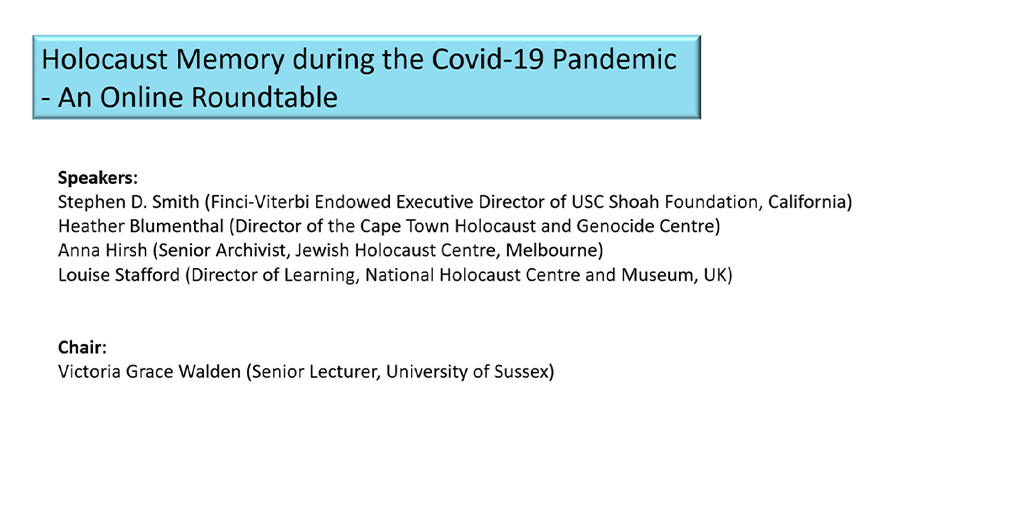
Holocaust Memory during the Covid-19 Pandemic An Online Roundtable
On Monday 18th May 2020, Digital Holocaust Memory hosted its first online roundtable, which focused on Holocaust memory during the Covid-19 Pandemic. The speakers were Stephen D. Smith (USC Shoah Foundation, California), Heather Blumenthal (Cape Town Holocaust and Genocide Centre), Anna Hirsh (Jewish Holocaust Centre, Melbourne) and Marc Cave (National Holocaust Centre and Museum, UK).
If you missed the webinar, you can catch-up on the conversation below, which has been divided into four segments based on the themes of the roundtable:
- Moving to online-only provision
- Communicating and working with survivors
- Commemorations
- Digital futures
Moving to Online-Only Provision
Communicating and Working With Survivors
Commemorations
Digital Futures
Questions
Some of the further questions asked and explored during the event and afterwards on Twitter (#HMCovid19) are listed below, do share your thoughts and experiences using the hashtag on Twitter or in the comments sector below:
Thinking about the appropriateness of digital media for Holocaust memory
- How do we make sure we do not sensationalize our materials by putting them online and on social media?
- Do those working in Holocaust museums and memorials have any worries about digital content being perceived as entertaining or playful as some Holocaust museums at former camps seem to?
Engaging and tracking audiences
- Although all of the things we are talking about are digital/online, how do you think we can still encourage people, particularly schools, teachers and students to do something active and beyond their initial online engagement? For example, how do we get users to go beyond watching a video passively, or viewing an online exhibition, especially to give them that sense of community and connection?
- How do you feel about teaching the Holocaust to students learning from home and who might be vulnerable or in vulnerable home situations? Do you think teaching the Holocaust should be halted because of this? How can we provide pastoral care in this situation? Have you changed some of your content?
- Who is your normal audience, and have you reached any unexpected audiences?
- Do you know who is accessing your online materials? How are you tracking digital access?
Thinking about digital futures
- Are organisations planning differently for how to involve students, teachers and educators in HMD events for 2021?
- What positives has this situation added to what you already do?
- What is the landscape for collecting survivor interviews going to look like for the foreseeable future?